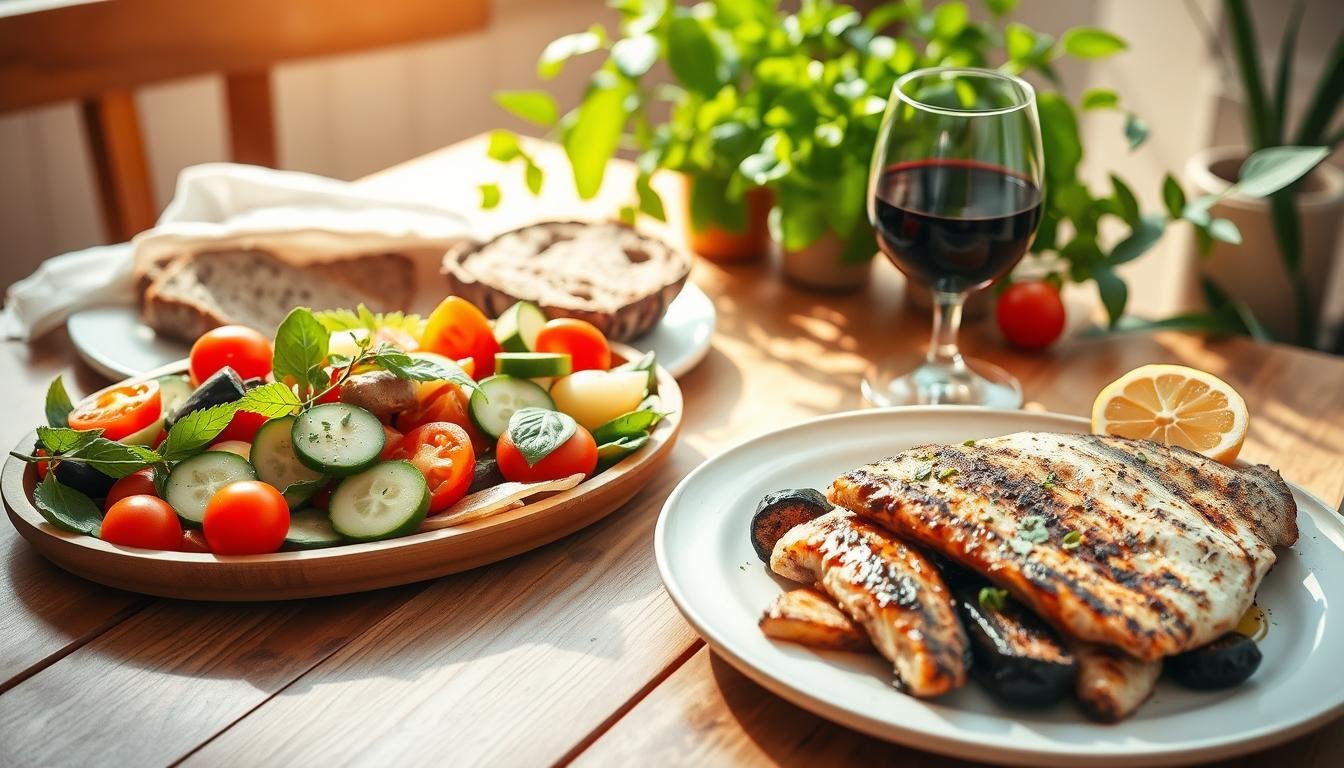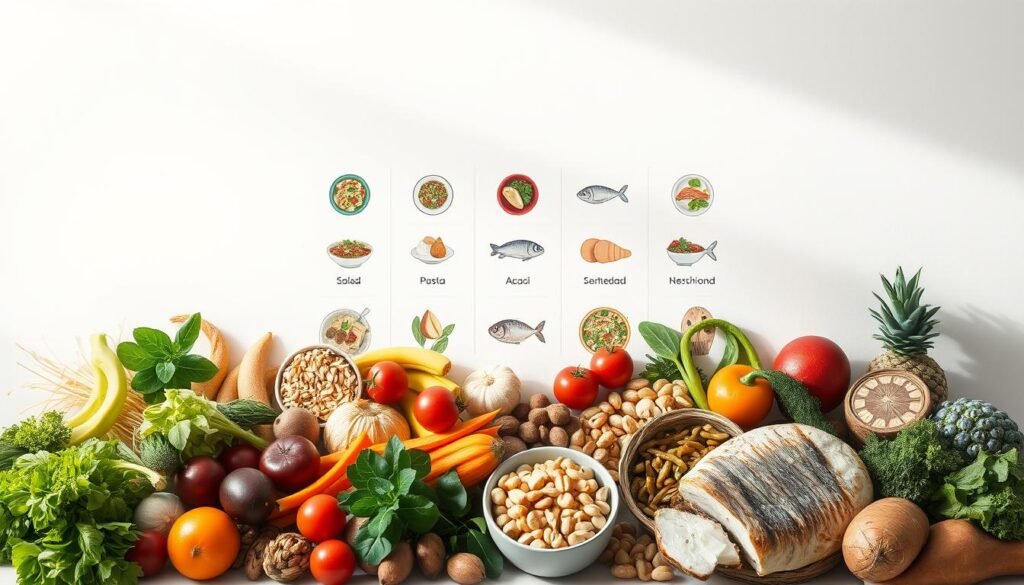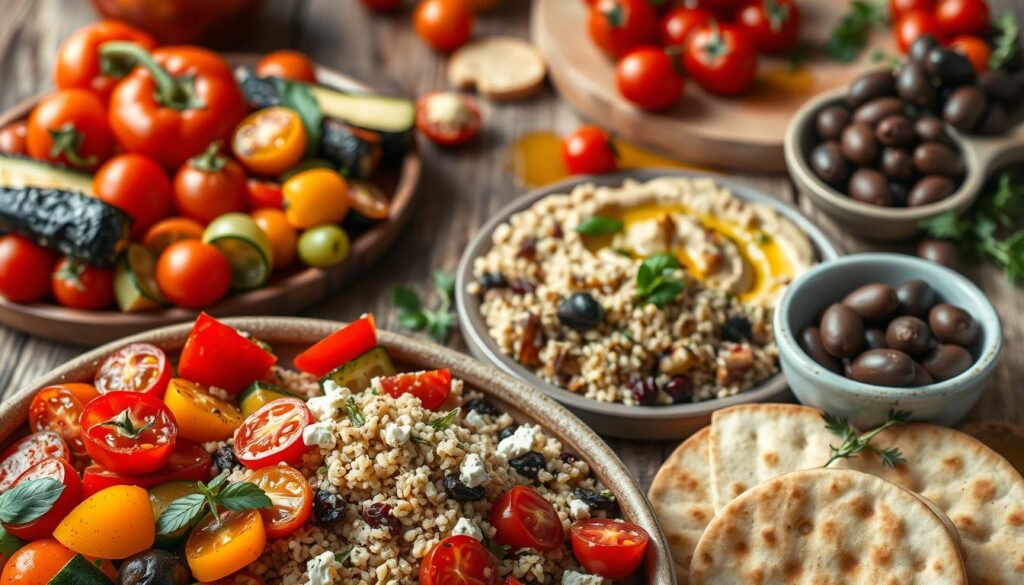7-Day Mediterranean Diet Meal Plan to Kickstart Your Health

I still remember the first time I tried the Mediterranean diet. It felt like opening a doorway to a new, vibrant lifestyle! The fresh flavors and colorful ingredients brought joy to my cooking. It was like discovering a hidden gem.
Have you ever felt a sudden burst of energy and positivity from eating well? That’s what the Mediterranean diet meal plan gives you!
Imagine starting your day with a refreshing breakfast. Then, enjoying delightful lunches and dinners that satisfy your hunger and nourish your soul. For a whole week, you can dive into a healthy Mediterranean diet plan. It’s filled with rich flavors and knows you’re getting healthier.
Ready to start this delicious journey? Let’s explore a 7-day meal plan Mediterranean diet. It’s going to change your dining experience and kickstart your health!
Key Takeaways
- The Mediterranean diet emphasizes fresh, natural ingredients.
- Enjoy a variety of fruits, vegetables, whole grains, and healthy fats.
- This 7-day meal plan promotes both flavor and health benefits.
- Expect boosts in energy and overall well-being.
- Simple, approachable meal plans make cooking exciting and fun!
What Is the Mediterranean Diet?
The Mediterranean diet is more than just food. It’s a way of life filled with tradition, flavor, and health benefits. I found it easy and satisfying to follow. It focuses on whole foods, lean proteins, and healthy fats.
It also includes lots of colorful fruits and veggies. This diet is a treasure trove of healthy meals for everyone. It’s perfect for beginners too.
Overview of Key Components
The Mediterranean diet is based on plant-based foods. This includes fruits, veggies, whole grains, nuts, and seeds. It uses nature’s abundance to make meals that are tasty and healthy.
It also includes heart-healthy fats like olive oil and fish. Dairy is used in moderation, and red meat is kept to a minimum. This makes it a great diet for beginners.
Health Benefits of the Diet
The Mediterranean diet has many health benefits. It helps keep your weight healthy and supports your heart. It also lowers the risk of chronic diseases and boosts overall well-being.
Many studies show its health benefits. It’s a popular choice for a healthy eating lifestyle. Whether you want to lose weight or improve heart health, the benefits are many.
If you want to try nutritious Mediterranean meals, you’ll love it! This diet is about feeling good and living well.
Essential Foods in the Mediterranean Diet
Starting a Mediterranean diet? It’s a great choice! This diet brings tasty flavors and health benefits. A balanced Mediterranean meal plan focuses on fresh, healthy foods. Let’s explore the key foods!
Fruits and Vegetables
Fresh fruits and veggies are key in a Mediterranean diet. Think of tomatoes, greens, and oranges. They’re full of vitamins, antioxidants, and fiber.
Make sure to eat a fruit with every meal. Also, fill half your plate with different veggies. Your body will really appreciate it!
Whole Grains
Whole grains are also important in the Mediterranean diet. Foods like whole-grain bread, quinoa, and brown rice give you energy. They’re full of nutrients.
Add these grains to your meals for more energy and fiber. It’s a smart choice for your diet.
Healthy Fats
Healthy fats are not bad at all. Olive oil, nuts, and avocados are great for your heart. They taste amazing too.
Try drizzling olive oil on salads or using it with whole-grain bread. It’s a tasty and healthy choice.

How the Mediterranean Diet Works
Welcome to the Mediterranean diet’s heart! Ever wondered why it’s so good and loved by many? Let’s explore its core nutrition principles. See how healthy mediterranean diet meals work and how a good meal planning guide can change your eating.

Nutrition Principles
The Mediterranean diet focuses on whole, unprocessed foods. Think of fresh fruits and veggies, whole grains, lean proteins, and healthy fats like olive oil. These meals are full of vitamins, minerals, and antioxidants.
Animal proteins are less common, replaced by plant-based foods like beans, legumes, and nuts. Seafood is a big part, offering omega-3 fatty acids. Dairy and meat are small parts, but they’re not the main focus. This mix ensures you get lots of nutrients.
Meal Timing and Portion Sizes
Meal timing is key. The diet suggests eating smaller, more frequent meals. This keeps your energy up and hunger down. Portion control is also important. Enjoying each bite and listening to your body helps you eat just right.
A good meal planning guide is essential. It helps plan meals that are varied and balanced. With planning, you can make a week of delicious, healthy meals.
Creating a 7-Day Meal Plan Overview
Planning meals for a week is easy with our mediterranean diet meal planning guide! It’s great for both newbies and experts. Let’s explore how to make a meal plan that’s both tasty and healthy!
Structure of the Meal Plan
First, let’s talk about meal plan structure. Each day should have three meals: breakfast, lunch, and dinner. This ensures you eat all the important food groups every day.
Here’s a quick breakdown of how to structure your meals:
| Meal | Components |
|---|---|
| Breakfast | Whole grains, fruit, a source of healthy fat |
| Lunch | Vegetables, lean protein, healthy fat |
| Dinner | Vegetables, whole grains, lean protein |
Importance of Variety
Variety makes meal planning exciting. Using many ingredients keeps your taste buds happy and your body nourished. Imagine a salad with tomatoes, cucumbers, olives, and feta – it’s a treat for your eyes and taste buds!

Change up your meals with different mediterranean diet meal plan ideas each week. Try swapping grilled chicken for chickpea salad or quinoa for bulgur pilaf. This makes easy mediterranean meal planning a fun part of your day!
Daily Breakdown of the Meal Plan
Starting my Mediterranean meal plan is easy! Each day brings new and tasty dishes. Here’s a look at the first four days.
Day 1: Breakfast, Lunch, and Dinner
Breakfast: Begin with a Greek yogurt parfait. It has honey, berries, and granola. It’s a bright start to the day!
Lunch: Enjoy a Greek salad. It’s full of tomatoes, cucumbers, olives, and feta. It’s topped with olive oil and oregano.
Dinner: Have baked salmon with quinoa and roasted veggies. It’s both healthy and filling.
Day 2: Breakfast, Lunch, and Dinner
Breakfast: Try whole-grain toast with avocado, sea salt, and chili flakes. It’s simple yet tasty.
Lunch: Eat tabbouleh with bulgur, parsley, mint, tomatoes, and lemon. Add hummus and pita for a complete meal.
Dinner: Enjoy chickpea and spinach stew. Serve it with whole-grain bread for extra flavor.
Day 3: Breakfast, Lunch, and Dinner
Breakfast: Make a smoothie with almond milk, spinach, banana, and almond butter. It’s nutritious and yummy!
Lunch: Have a mezze platter with grilled veggies, olives, feta, and dips like tzatziki and hummus.
Dinner: Eat whole-grain pasta with cherry tomatoes, basil, garlic, and olive oil. Top it with Parmesan cheese.
Day 4: Breakfast, Lunch, and Dinner
Breakfast: Have Greek-style eggs with tomatoes, peppers, and onions. Serve it with whole-grain toast.
Lunch: Try a falafel wrap with lettuce, tomatoes, cucumbers, and tahini sauce. It’s a tasty and easy meal.
Dinner: End the day with ratatouille, a vegetable stew. Enjoy it with a crunchy baguette.
Snacks and Extras for the Week
Hey there! Having snacks and extras ready is super helpful for a healthy Mediterranean diet. Let’s explore some great options that make meals quick, tasty, and easy on the wallet!

Healthy Snack Options
Snacks are key for a balanced diet. Here are some top picks for a budget-friendly Mediterranean meal plan:
| Snack | Benefits |
|---|---|
| Greek Yogurt with Honey | A great source of protein and probiotics to support digestive health. |
| Mixed Nuts and Dried Fruits | Packed with healthy fats, fiber, and vitamins – perfect for a quick energy boost! |
| Hummus with Veggie Sticks | Provides fiber, protein, and a variety of vitamins – delicious and satisfying. |
| Olives and Cheese | Offers healthy fats and protein, making it an ideal savory snack. |
Beverages to Include
Don’t forget about drinks! Staying hydrated is crucial for a healthy Mediterranean diet. Here’s a quick rundown of drinks to include:
- Water: Always prioritize water as your primary beverage.
- Herbal Teas: Perfect for a calming, flavorful drink without any added sugars.
- Red Wine: Enjoy in moderation – it offers antioxidants and adds a delightful touch to meals.
- Fresh Juices: Opt for freshly squeezed to avoid added sugars and preservatives.
With these snacks and drinks ready, following your healthy Mediterranean diet plan is easy! You’re all set for a flavorful and nourishing week.
Tips for Meal Prep on the Mediterranean Diet
Meal prep makes your Mediterranean diet journey easier and more fun! A good plan saves time, reduces stress, and helps you stick to your diet. Let’s explore some key tips for a smooth Mediterranean diet meal prep plan!
Grocery Shopping List Essentials
First, let’s look at your Mediterranean diet shopping list. Focus on whole foods like fresh produce, whole grains, and healthy fats. Here’s what you need:
- Fruits and Vegetables: Get lots of tomatoes, cucumbers, bell peppers, spinach, kale, and herbs like basil and parsley.
- Whole Grains: Buy whole wheat bread, quinoa, brown rice, and oats.
- Healthy Fats: Use extra virgin olive oil, avocados, and nuts and seeds.
- Proteins: Include fish like salmon and tuna, legumes like lentils and chickpeas, and Greek yogurt.

Batch Cooking Strategies
Batch cooking is a big help! It makes planning meals easier and keeps healthy food ready. Here are some tips to start:
- Cook in Bulk: Make big batches of grains, beans, and lean proteins for different meals.
- Prep Produce Ahead: Wash and chop veggies as soon as you get home, so they’re ready when you need them.
- Use Versatile Ingredients: Roast a big tray of veggies or cook a big pot of lentils for different dishes.
- Freezing: Freeze soups, stews, and casseroles in individual portions for later.
By using these tips, your Mediterranean diet meal prep will be easy. You’ll enjoy tasty, healthy meals without daily stress. Happy cooking!
Adapting the Meal Plan for Dietary Restrictions
Changing a mediterranean diet meal plan for weight loss to fit different diets is easy. Whether you’re on a vegetarian or gluten-free diet, you can still enjoy its health benefits.
Vegetarian and Vegan Options
Vegetarians and vegans have lots of tasty options in the Mediterranean diet. No meat? No problem! You can use legumes, grains, and veggies to make your meals rich and full of nutrients.
Try chickpea salads, quinoa-stuffed peppers, and lentil soups. These dishes are great for a vegetarian diet. They’re also full of protein and fiber. Use almond or oat milk instead of dairy and olive oil for fat.

Gluten-Free Alternatives
Need a gluten-free diet? No worries—there are plenty of gluten-free Mediterranean meals. Focus on fresh veggies, lean proteins, and healthy fats. With a few swaps, you can enjoy the Mediterranean diet without gluten.
Replace regular grains with gluten-free ones like quinoa or rice. Enjoy grilled fish with quinoa or a vegetable ratatouille. Always check food labels for gluten and choose gluten-free ingredients.
With these adjustments, anyone can enjoy the Mediterranean diet’s flavors and health benefits. It’s tailored to your dietary needs!
Cooking Techniques in Mediterranean Cuisine
Learning Mediterranean cooking techniques can make any meal special! You can grill veggies or steam fish easily. Here are some simple Mediterranean diet ideas to try at home.
Grilling and Roasting
Grilling and roasting are key in Mediterranean cooking. Imagine grilling veggies like bell peppers and zucchini until they’re charred. Or roast a chicken with lemon, garlic, and rosemary for a tasty, healthy meal. These methods keep flavors in and make the diet healthy.

Sautéing and Steaming
Sautéing and steaming are also crucial. Think about sautéing spinach and garlic in olive oil until soft. Or steaming salmon with Mediterranean spices. These methods keep nutrients in and make food taste great. Plus, they’re fast for busy weeknights!
These techniques add variety and boost flavor and nutrition in your meals. So, why not try these Mediterranean diet ideas? You’ll find healthy eating can be tasty and fun!
Staying Motivated on Your Mediterranean Journey
Starting a 7-day meal plan mediterranean diet is exciting. But, staying motivated can be tough. Here are some tips to keep you going and make sure you enjoy your Mediterranean diet plan for a week!
Setting Realistic Goals
It’s important to set goals you can reach. Here are some tips for setting realistic goals:
- Start Small: Begin with small changes like adding more fruits and veggies to your meals.
- Set Specific Targets: Aim to cook three new Mediterranean recipes each week.
- Be Kind to Yourself: Don’t be too hard on yourself if you make mistakes.

Tracking Progress
Tracking your progress keeps you motivated. Here’s how to do it:
- Use a Food Journal: Writing down what you eat helps you stay on track and spot patterns.
- Take Photos: Document your meals to see your progress visually.
- Celebrate Small Wins: Acknowledge every success, big or small.
Remember, the secret to a successful 7-day meal plan mediterranean diet is to stay consistent and positive. Stay motivated, enjoy your journey, and celebrate every delicious milestone!
Common Mistakes to Avoid
If you’re starting the Mediterranean diet, it’s exciting—trust me, I’ve been there! It’s rewarding, but there are traps to watch out for.
Overlooking Portion Control
Even with a balanced mediterranean meal plan, portion control is key. It’s tempting to eat more because everything is healthy. But, that’s not right. Hummus, for example, is nutritious but can be overeaten.
Here are some tips for portion control:
- Use smaller plates: It tricks your mind into thinking you’re eating more.
- Measure your food: Get used to standard serving sizes by using measuring cups.
- Listen to your body: Eat slowly and pay attention to when you start feeling full.
Ignoring Hydration
When following easy mediterranean diet ideas, another mistake is ignoring hydration. Water is a key part of the diet. It helps your body absorb nutrients better. Sometimes, when you think you’re hungry, you’re actually just thirsty!
Here are some hydration tips:
- Carry a water bottle: Make it a habit to sip throughout the day.
- Set reminders: Use your phone to remind you to drink water every hour.
- Eat water-rich foods: Include fruits like watermelon and cucumbers in your meals.

Staying on track with a balanced mediterranean meal plan is more than just picking the right foods. Avoiding common mistakes like neglecting portion control and hydration helps. Let’s make every meal count and enjoy the journey!
Final Thoughts: Embracing the Mediterranean Lifestyle
As we finish our look at the Mediterranean diet, it’s clear it’s more than food. It’s a way to live healthier and feel better. By choosing the Mediterranean diet, you’re making a big step towards a better life.
Long-Term Benefits
The Mediterranean diet is known for its health benefits. It can lower the risk of heart disease, diabetes, and some cancers. It’s not just about living longer. It’s about feeling great every day.
Imagine having lots of energy, clear thinking, and staying healthy without trying too hard. It’s a wonderful idea, isn’t it?
Incorporating Healthy Habits
To live a healthy life, start small. Eat more fresh fruits and veggies, whole grains, and use olive oil. Don’t forget the joy of sharing meals with loved ones.
Stay active too. A walk after dinner or a morning yoga session can make a big difference. These changes are small but powerful. They turn following a diet into a vibrant, fulfilling lifestyle.
2 thoughts on “7-Day Mediterranean Diet Meal Plan to Kickstart Your Health”